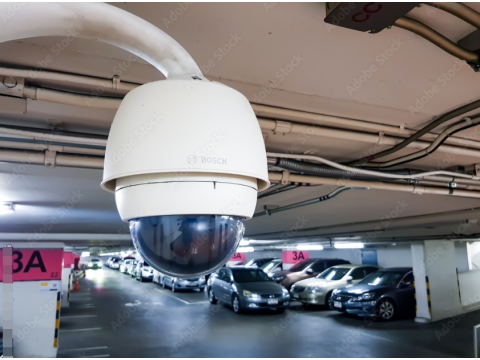Parking Lot Surveillance Systems
Surveillance systems play a crucial role in ensuring the safety and security of vehicles in parking lots. From monitoring unauthorized access to resolving disputes, a well-designed surveillance system can significantly enhance security and operational efficiency.
Key Functions of Parking Lot Surveillance
Preventing Unauthorized Access
- Surveillance cameras with motion detection ensure monitoring of perimeter areas.
- Proper lighting and overlapping camera coverage eliminate blind spots.
Conflict Resolution
- High-resolution cameras help identify incidents like vehicle damage or theft.
- Recorded footage serves as evidence for insurance claims or disputes.
Time and Entry Registration
- License plate recognition (LPR) systems track vehicle entry and exit times.
- Ideal for enforcing parking rules and managing paid parking areas.
Selecting Surveillance Cameras for Parking Lots
1. Camera Types
- Analog Cameras: Reliable and cost-effective for basic monitoring.
- IP Cameras: Offer high resolution, remote access, and integration with advanced software.
2. Durability
- Cameras must be weatherproof (IP66 or higher) and withstand extreme temperatures.
- Vandal-resistant designs ensure durability in public or high-risk areas.
3. Infrared (IR) Illumination
- Essential for low-light conditions or nighttime monitoring.
- Supplement cameras with IR floodlights for large areas.
4. Dynamic Range and Clarity
- Cameras with Wide Dynamic Range (WDR) handle challenging lighting conditions, such as glare from vehicle headlights.
Setting Up Parking Lot Surveillance
1. Strategic Placement
- Place cameras at entry/exit points, perimeters, and key parking zones.
- Ensure overlapping views to eliminate blind spots.
2. Wired vs. Wireless Systems
- Wired Systems: Offer stability but require more effort for cable management.
- Wireless Systems: Easier to install but may be susceptible to interference.
3. Integration with Security Systems
- Pair surveillance with alarm systems to alert security personnel of breaches.
- Combine with vehicle barriers or gates for access control.
Monitoring Parking Spaces
Residential Parking Lots
- Use compact cameras to monitor designated parking spaces.
- Opt for mobile access to check on vehicles remotely via smartphone.
Commercial Parking Garages
- Install high-resolution cameras to monitor large areas.
- Use LPR systems for automated ticketing and entry management.
Temporary Parking Areas
- Portable wireless systems are ideal for event-specific or temporary parking setups.
Remote Monitoring and Mobile Access
With advancements in technology, surveillance systems now support real-time monitoring via smartphones or computers.
- Mobile Apps: Enable live viewing, push notifications, and incident alerts.
- Cloud Storage: Securely store footage and access archives remotely.
- Limitations: Ensure sufficient internet bandwidth for high-quality video streaming.
Conclusion
- Comprehensive Security: Parking lot surveillance ensures vehicle safety and enhances security.
- Tailored Solutions: Choose cameras and systems based on the size, layout, and specific needs of the parking lot.
- Advanced Features: License plate recognition, motion detection, and night vision enhance system functionality.
Investing in a robust parking lot surveillance system is an effective way to improve security, reduce liability, and provide peace of mind for vehicle owners and operators alike.
Indoor Surveillance Systems
10/01/2025

